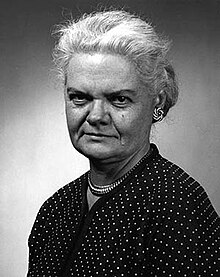Lucille Farrier Stickel
| Lucille Farrier Stickel | |
|---|---|
 |
|
| Born |
January 11, 1915 Hillman, Michigan, U.S. |
| Died | February 22, 2007 (aged 92) Asheville, North Carolina, U.S. |
| Nationality | American |
| Education | Biologist |
| Alma mater | University of Michigan |
| Known for | Work on wildlife toxicology |
| Influenced | Rachel Carson |
| Notable awards | Federal Women's Award Distinguished Service Award Aldo Leopold Memorial Award Rachel Carson Award |
| Spouse | William Henson Stickel |
Lucille Farrier Stickel (January 11, 1915 – February 22, 2007) was an American wildlife toxicologist and director of the Patuxent Wildlife Research Center from 1972 to 1982. Her research focused extensively on contaminants in wildlife ecosystems and her research on the effects of the pesticide DDT helped form the basis for Rachel Carson's book Silent Spring. She was also the first woman to both become a senior scientist as a civil servant of the US government and to be director for a national research laboratory.
Stickel was born in Hillman, Michigan. She obtained her Bachelor of Science from Eastern Michigan University in 1936, graduating as a member of Phi Beta Kappa. She went to the University of Michigan for both her master's degree and Ph.D and acquired them in 1938 and 1949, respectively.
The first major publication Stickel made was an environment report in 1946, the first of a number of reports she would make on the ecological effects of the pesticide DDT. These reports, among the rest of her body of work, helped lead to the creation of wildlife toxicology as a field of study, as the impacts could affect not just wildlife on land, but also in rivers and in the soil. She first joined the Patuxent Wildlife Research Center in 1942 after obtaining her bachelor's degree. Several years later, she took time off in order to accomplish her Ph.D., before returning to work at Patuxent in 1961, which led to her being named director of the facility in 1972. Stickel retained the position for a decade before retiring in 1982.
Stickel was presented the Federal Women's Award by the Department of the Interior in 1968, along with a Distinguished Service Award in 1973. The Wildlife Society awarded Stickel the Aldo Leopold Memorial Award in 1974 for her work on wildlife conservation. The Society of Environmental Toxicology and Chemistry bestowed her with the Rachel Carson Award in 1998. Stickel was also inducted into the Michigan Women's Hall of Fame in 2014 for her environmental work.
...
Wikipedia
